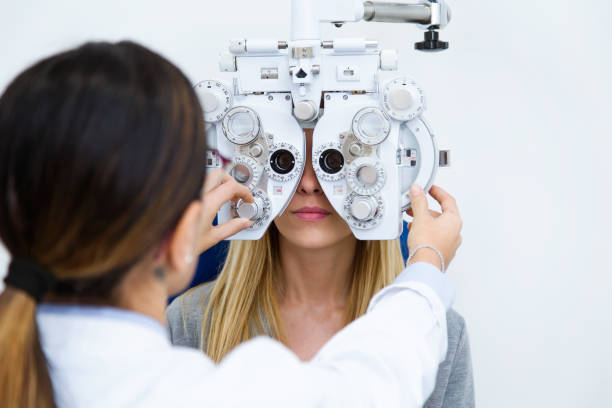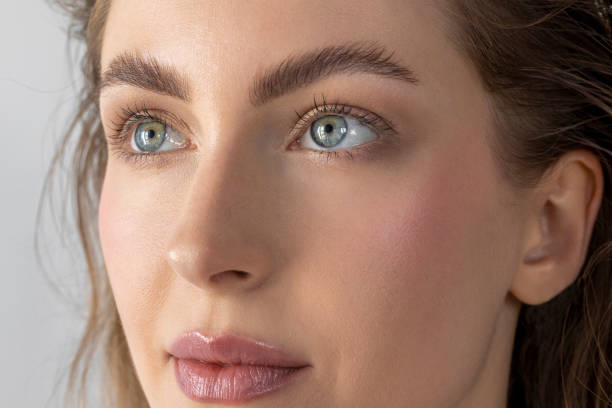Introduction
Your eyes are the windows to the world you live in. Having clear and sharp vision lets you enjoy everyday moments, like reading your favorite book, watching a colorful sunset, or recognizing a friend in a busy crowd. But did you know that your overall health plays a big role in how well your eyes work? Taking good care of your whole body can help keep your eyes strong and healthy for many years ahead.
In this post, we will look at the strong connection between your vision and overall health. You’ll find easy tips to help protect your eyesight every day. Plus, we’ll explain how to keep your vision clear and sharp for many years ahead.
Why Vision and Health Are Connected
Your eyes are an important part of your body, so anything that affects your health can also impact your vision. Health conditions like diabetes, high blood pressure, and even a poor diet can harm your eyes over time. That’s why taking care of your eyes means more than just regular visits to the optometrist—it also means looking after your overall health every day.
Common Health Issues That Affect Vision
- Diabetes can lead to diabetic retinopathy, a condition that harms the tiny blood vessels in the retina, which may cause vision problems.
- High blood pressure can cause hypertensive retinopathy, a condition that affects the blood flow in your eyes and can harm your vision over time.
- Vitamin deficiencies, especially low levels of vitamins A, C, and E, can negatively impact your eye health and increase the risk of vision problems.
- Obesity raises the risk of developing health conditions that can damage your vision, making it important to maintain a healthy weight for good eye health.
The American Academy of Ophthalmology says that keeping your overall health in good shape can help prevent many common eye problems. Taking care of your body is key to protecting your vision.

Top Tips to Protect Your Vision and Improve Eye Health
Taking care of your eyes each day is easier than you may think. Here are some easy and practical tips to help protect your vision and keep your eyes healthy for years to come:
1. Eat Eye-Healthy Foods
Eating a balanced diet full of vitamins and minerals is key to keeping your vision strong. Foods rich in antioxidants, such as vitamins C and E, zinc, and omega-3 fatty acids, are especially helpful for good eye health.
Best foods for eye health:
- Leafy green vegetables like spinach and kale are packed with nutrients that support healthy eyes.
- Fish such as salmon and tuna are rich in omega-3 fatty acids, which help keep your eyes healthy and protect your vision.
- Nuts and seeds are full of vitamins and healthy fats that support good eye health and protect your vision.
- Citrus fruits and berries are rich in vitamin C and antioxidants, which help keep your eyes healthy and protect them from damage.
- Carrots and sweet potatoes are packed with vitamin A and other nutrients that help support good vision and keep your eyes healthy.
2. Regular Eye Exams
Regular eye exams can find problems early, often before you even notice any symptoms. Adults should have a full eye exam every one to two years, or more frequently if their eye doctor recommends it.
3. Protect Your Eyes from UV Rays
Ultraviolet (UV) light from the sun can raise your risk of developing cataracts and macular degeneration. To protect your eyes, always wear sunglasses that block 100% of UVA and UVB rays whenever you are outside.
4. Manage Screen Time
Looking at screens for long periods can cause eye strain and discomfort. To help reduce this, follow the 20-20-20 rule: every 20 minutes, take a break and focus on something about 20 feet away for at least 20 seconds. This simple habit helps prevent eye fatigue and dryness.
5. Quit Smoking
Smoking raises the chance of developing serious eye diseases like cataracts and age-related macular degeneration. Quitting smoking not only helps protect your vision but also improves your overall health.
6. Stay Hydrated
Drinking plenty of water helps keep your eyes moist and comfortable. Staying well-hydrated can reduce dryness and irritation, supporting overall eye health.

The Role of Exercise in Vision Health
Regular physical activity improves blood flow and helps manage health issues like diabetes and high blood pressure, which can harm your vision. Exercise also lowers inflammation and reduces oxidative stress, both of which can damage the cells in your eyes.
Try to get at least 30 minutes of moderate exercise on most days of the week. Activities like walking, swimming, or cycling are excellent choices to keep your body and eyes healthy.
How Aging Affects Vision and What to Do
As you get older, your risk for certain eye problems increases. Some of the most common age-related eye conditions include:
- Presbyopia is a common condition that makes it harder to focus on close-up objects, especially as you age.
- Cataracts cause the lens of the eye to become cloudy, making vision blurry or dim. This condition often develops with age.
- Glaucoma is a condition where increased pressure inside the eye damages the optic nerve. If not treated, it can lead to vision loss over time.
- Age-related Macular Degeneration (AMD) is an eye condition that causes the loss of central vision, making it harder to see fine details clearly.
Aging is a natural part of life, but making healthy lifestyle choices can help slow down age-related eye problems and keep your vision strong longer:
- Eat a diet rich in nutrients that help keep your eyes healthy and protect your vision.
- Make sure to schedule regular eye exams to spot vision problems early and keep your eyes healthy over time.
- Always wear sunglasses that block UV rays to shield your eyes from harmful sun damage and help keep your vision healthy.
- Stay active by exercising regularly, and avoid smoking to protect your eyes and maintain good vision for years to come.
The National Eye Institute provides great resources to help you learn more about age-related eye health and how to protect your vision as you get older.
Understanding Common Eye Conditions
Here’s a quick look at common eye problems that are linked to your overall health:
| Eye Condition | Description | Health Link |
|---|---|---|
| Diabetic Retinopathy | Damage to retina blood vessels | Diabetes control critical |
| Cataracts | Lens clouding, blurry vision | UV exposure, aging, smoking |
| Glaucoma | Optic nerve damage, vision loss | High eye pressure, genetics |
| Macular Degeneration | Loss of central vision | Aging, smoking, diet |
| Dry Eye Syndrome | Insufficient tears, irritation | Screen time, dehydration |
Vision and Mental Health: A Surprising Connection
Poor vision can affect more than just your eyesight—it can also impact your mental health. Struggling to see clearly may cause frustration, lower your independence, and even lead to social isolation or depression. On the other hand, taking care of your vision helps improve your quality of life and keeps your mind sharp.
How to Choose the Right Eye Care Professional
- An optometrist offers regular eye exams and vision tests to check your eye health. They can also prescribe glasses or contact lenses to help you see clearly.
- An ophthalmologist is a medical doctor who diagnoses and treats eye diseases. They also perform eye surgeries when needed to help protect or improve your vision.
- An optician helps fit and provide glasses or contact lenses based on your prescription. They make sure your eyewear fits comfortably and works well for your vision needs.
Regular visits to an optometrist or ophthalmologist help keep your eyes healthy. These check-ups can catch eye problems early, making treatment easier and more effective.

Quick Vision Health Checklist
- Include foods high in antioxidants and omega-3 fatty acids in your diet to support strong and healthy eyes.
- Make sure to schedule regular eye exams to keep your vision clear and detect any issues early.
- Always wear sunglasses that block UV rays to protect your eyes from sun damage and keep your vision healthy.
- Limit the amount of time you spend looking at screens, and remember to follow the 20-20-20 rule to reduce eye strain and keep your eyes comfortable.
- Avoid smoking to help protect your eyes and reduce the risk of vision problems. Quitting improves both your eye health and overall well-being.
- Drink plenty of water every day to stay hydrated, which helps keep your eyes moist and reduces dryness and irritation.
- Exercise regularly to improve blood flow, support overall health, and protect your vision from diseases linked to inactivity.
- Keep chronic conditions like diabetes and high blood pressure under control to protect your eyes and reduce the risk of vision problems.
Conclusion: Take Charge of Your Vision and Health Today!
Your vision is priceless, and protecting it begins with the choices you make every day. By eating nutritious foods, staying active, and visiting your eye doctor regularly, you can keep your eyesight clear and healthy for many years. Remember, your eyes are connected to your whole body—so take good care of them with healthy habits and regular check-ups!
What steps do you take to keep your vision healthy? Share your tips or questions in the comments below! If this guide helped you, please share it with your friends and family. Your eyes will definitely thank you!

